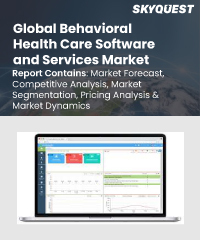
Report ID: SQMIG35G2219

Report ID:
SQMIG35G2219 |
Region:
Global |
Published Date: February, 2024
Pages:
157
|
Tables:
93 |
Figures:
76
Behavioral Health Care Software and Services Market size was valued at USD 3.73 Billion in 2023 and is poised to grow from USD 4.21 Billion in 2024 to USD 11.02 Billion by 2032, growing at a CAGR of 12.8% during the forecast period (2025-2032).
The global behavioral health care software and services market is experiencing significant growth, driven by several key factors that reflect the evolving landscape of mental health care worldwide. Behavioral health care software and services encompass a wide range of solutions designed to support the diagnosis, treatment, and management of mental health conditions, including electronic health records (EHR), telehealth platforms, practice management systems, and patient engagement tools.
One of the primary drivers of market growth is the increasing prevalence of mental health disorders globally, coupled with a growing recognition of the importance of mental health and well-being. Factors such as stress, anxiety, depression, substance abuse, and other behavioral health conditions have become pervasive issues affecting individuals of all ages and demographics, driving the demand for effective and accessible mental health care solutions. Moreover, the ongoing COVID-19 pandemic has further accelerated the adoption of behavioral health care software and services, as lockdowns, social distancing measures, and isolation have exacerbated mental health challenges for many individuals worldwide.
The pandemic has underscored the importance of remote care delivery and telehealth solutions, enabling mental health professionals to reach and support patients virtually, thereby bridging geographical barriers and increasing access to care. Telepsychiatry and teletherapy platforms have witnessed unprecedented growth, providing patients with convenient and confidential access to counseling and psychiatric services from the comfort of their homes.
Additionally, the integration of technology and artificial intelligence (AI) into behavioral health care software is driving innovation and efficiency in mental health care delivery. AI-powered tools and algorithms are enabling providers to analyze patient data, identify patterns, predict outcomes, and personalize treatment plans, leading to more effective and targeted interventions.
Furthermore, the shift towards value-based care models and the emphasis on population health management are driving healthcare organizations to invest in comprehensive behavioral health care software and services that facilitate care coordination, data sharing, and outcomes measurement. Despite the promising growth prospects, the behavioral health care software and services market face challenges such as data privacy and security concerns, interoperability issues, and workforce shortages in the mental health care sector.
Ensuring the privacy and confidentiality of patient information, achieving seamless interoperability between different software systems, and addressing the shortage of mental health professionals are critical considerations for stakeholders in the market. Nevertheless, with ongoing advancements in technology, increasing awareness and destigmatization of mental health issues, and the growing demand for accessible and effective mental health care solutions, the global behavioral health care software and services market is poised for continued growth and innovation in the coming years.
Our industry expert will work with you to provide you with customized data in a short amount of time.
REQUEST FREE CUSTOMIZATIONWant to customize this report? This report can be personalized according to your needs. Our analysts and industry experts will work directly with you to understand your requirements and provide you with customized data in a short amount of time. We offer $1000 worth of FREE customization at the time of purchase.

Report ID: SQMIG35G2219